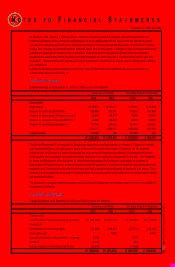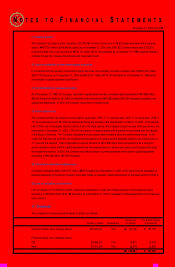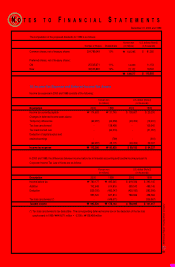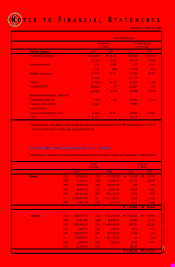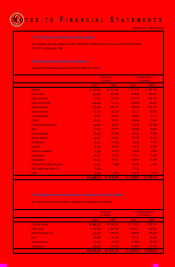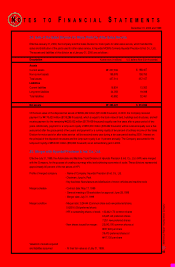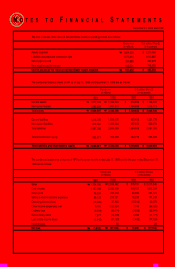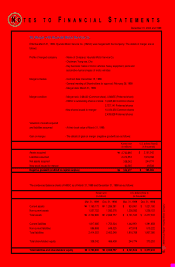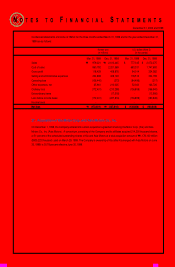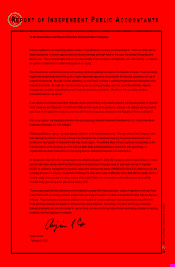Hyundai 2000 Annual Report Download - page 71
Download and view the complete annual report
Please find page 71 of the 2000 Hyundai annual report below. You can navigate through the pages in the report by either clicking on the pages listed below, or by using the keyword search tool below to find specific information within the annual report.
69
2000 Annual Report •Hyundai-Motor Company
REPORT OF INDEPENDENT PUBLIC ACCOUNTANTS
To the Shareholders and Board of Directors of Hyundai Motor Company:
We have audited the accompanying balance sheets of Hyundai Motor Company as of December 31, 2000 and 1999, and the
related statements of income, appropriations of retained earnings and cash flows for the years then ended, all expressed in
Korean won. These financial statements are the responsibility of the Company’s management. Our responsibility is to express
an opinion on these financial statements based on our audits.
We conducted our audits in accordance with auditing standards generally accepted in the Republic of Korea. Those standards
require that we plan and perform the audit to obtain reasonable assurance about whether the financial statements are free of
material misstatement. An audit includes examining, on a test basis, evidence supporting the amounts and disclosures in the
financial statements. An audit also includes assessing the accounting principles used and significant estimates made by
management, as well as evaluating the overall financial statement presentation. We believe that our audits provide a
reasonable basis for our opinion.
In our opinion, the financial statements referred to above present fairly, in all material respects, the financial position of Hyundai
Motor Company as of December 31, 2000 and 1999, and the results of its operations, changes in its retained earnings and its
cash flows for the years then ended in conformity with financial accounting standards in the Republic of Korea (see Note 2).
Also, in our opinion, the translated amounts in the accompanying financial statements translated into U.S. dollars have been
computed on the basis set forth in Note 2
Without qualifying our opinion, we draw attention to Note 1 to the financial statements. The operations of the Company have
been significantly affected, and may continue to be affected for the foreseeable future, by the general adverse economic
conditions in the Republic of Korea and in the Asia Pacific region. The ultimate effect of these significant uncertainties on the
financial position of the Company as of the balance sheet dates cannot presently be determined and, accordingly, no
adjustments have been made in the accompanying financial statements related to such uncertainties.
As discussed in Note 24 to the financial statements, effective January 31, 2000, the Company sold the Sales Division for motor
parts for after-sales service, which handled the sales and distribution of the parts used for after-sales service, to Hyundai
MOBIS. In addition to the payment for the book value of the disposed net assets of ₩396,422 million ($314,696 thousand), the
Company shall receive payment for goodwill consisting of a lump-sum royalty of ₩50,000 million ($39,692 thousand), and for a
running royalty of ten percent of ordinary income of the Sales Division for motor parts for after-sales service which will be
received every year during a ten year period starting 2000.
The accompanying financial statements are not intended to present the financial position, results of operations and cash flows
in accordance with accounting principles and practices generally accepted in countries and jurisdictions other than the Republic
of Korea. The procedures and practices utilized in the Republic of Korea to audit such financial statements may differ from
those generally accepted and applied in other countries and jurisdictions. Accordingly, this report and the accompanying
financial statements and are not intended for use by those who are not informed about Korean accounting principles or auditing
standards and their application in practice.
Seoul, Korea,
February 9, 2001


